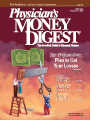Publication
Article
Physician's Money Digest
Look Forward to a Good Investor Year?
Author(s):
If you reflect on your life, most likely you willnotice an ebb and flow effect throughout.Some years you probably experienceddelightful highs (eg, medical school graduation,marriage, the birth of your first child), whileother years may have provided you with life'sharsher realities. It's the nature of life.And so it is with the stock market. It,too, experiences good and bad years.Hopefully, 2003 will bear witness to apositive year in the market.
NEW YEAR, NEW OUTLOOK
Most investors won't deny that2002 was a rough year for the market.The Dow dropped 17%, its worst losssince 1977. The Nasdaq collapsedagain (32%), its third worst year sinceits inception in 1972. And about 1trading day of every 2 had the S&P500 and Dow rising or falling at least1%, the highest volatility since 1938.These certainly aren't figures investorstake pleasure in remembering.
However, there is good news toreport in the new year, and plenty of it.So if investor pessimism is still plaguingyou, take the following good newsto heart. The last time the market fell 4 consecutiveyears was during the Great Depression. Inaddition, it's been more than 6 decades sincestocks failed to rise in the third year—2003 inthis case—of a presidential term.
Wall
Street Journal
If these facts alone don't inspire optimism, behappy that the majority is still gloomy. The 's year-end review noted, "After 3straight years of stock market misery, manyremain hunkered down amid risk of anotherslump." So many analysts, investors, and economistsbeing pessimistic is a strongly bullish sign.At a major turning point, the crowd is almostalways on the wrong side.
HISTORICAL COMFORTS
Wall Street Week
Regardless of what any forecastersays about this year's economy and/orstocks and bonds in general, it's a goodidea to take it with a very small grain ofsalt. Overall, forecasters' records arelousy. To demonstrate this fact, let'stake a look back at 2001. At the beginningof 2001, 22 different panelists onpredicted the Dow'svalue at the year's end. The range was11,400 on the low side to 13,170 onthe high side. The correct answerturned out to be 10,021—not evenclose to the panelists' predictions.
So let's forget about predictions,forecasts, ouija board readings, andTarot cards and simply stick with whatwe know to be true. This is what weknow from history:
• There is no haven found investingabroad. The Dow did far better than Italy,Britain, Spain, Switzerland, Belgium, France,and Germany in 2002, which has been the casefor well over a decade.
Barron's
• Stock mutual funds won't help. In a year-endlisting of more than 45 different typesof equity and income funds, just 7 (16%) outstrippedthe Dow for the past 5 years. And for thepast 10 years, only 1 (2%) managed to outstrip theDow. So forget about stock mutual funds.
• This past year was the third straight yearthat bonds beat stocks. The only other 2 timesthis occurred in the past 100 years were 1930 to1932 and again in 1939 to 1941. That's the badnews. The good news is that following 3 years ofsignificant underperformance, stocks comparedto bonds and then scored big gains over the following4 years, which would be 2003 to 2006.
• There have been only 4 periods whenstocks declined 3 years straight (including 1929to 1932 during the Depression). If history holds,2003 will be up for this reason alone.
So what's the best strategy for making moneyin 2003? Invest strictly in US-based companieswith increased dividends for a minimum of 10consecutive years. Seek higher dividend yields,particularly in tax-free accounts. In addition,attempt to weed out your losers, and get rid ofyour stock mutual funds if you can. Don't buybonds now unless you have some special need—the bull market in bonds is over. And last but notleast, relax a little. This ought to be a good yearfor properly selected stocks.
Bill Staton is chairman
of Staton Financial Advisors
LLC, a money
management firm whose
accounts were up in
2001 and again in 2002.
Join his free weekly
"Dollar-Bill Club" and
get a no-obligation trial
to Bill's weekly "EMoney
Digest" by emailing
bill@billstaton.com. Feel free to contact
Bill directly at 704-
365-2122, fax 704-365-1910, or visit his Web site
at www.billstaton.com.
